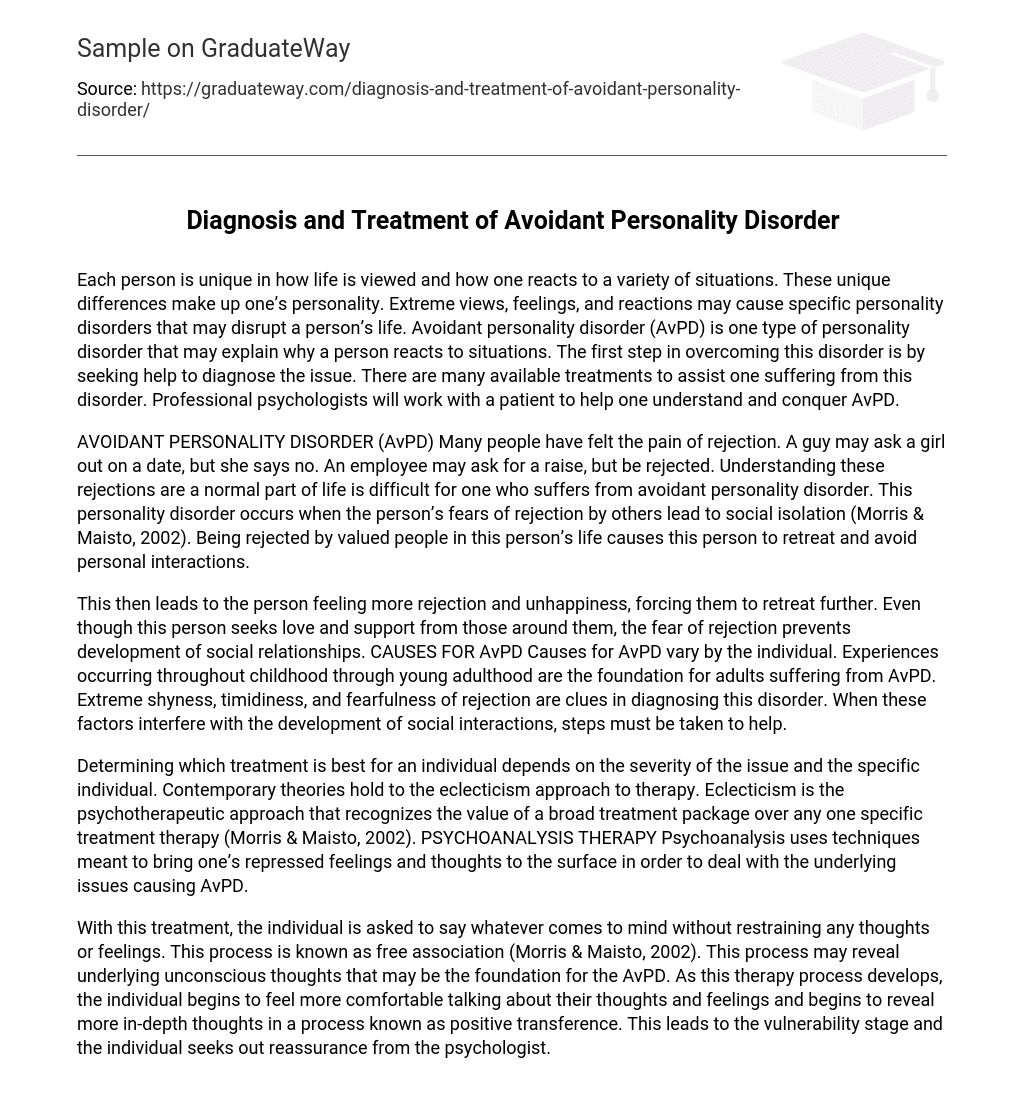Each person is unique in how life is viewed and how one reacts to a variety of situations. These unique differences make up one’s personality. Extreme views, feelings, and reactions may cause specific personality disorders that may disrupt a person’s life. Avoidant personality disorder (AvPD) is one type of personality disorder that may explain why a person reacts to situations. The first step in overcoming this disorder is by seeking help to diagnose the issue. There are many available treatments to assist one suffering from this disorder. Professional psychologists will work with a patient to help one understand and conquer AvPD.
AVOIDANT PERSONALITY DISORDER (AvPD) Many people have felt the pain of rejection. A guy may ask a girl out on a date, but she says no. An employee may ask for a raise, but be rejected. Understanding these rejections are a normal part of life is difficult for one who suffers from avoidant personality disorder. This personality disorder occurs when the person’s fears of rejection by others lead to social isolation (Morris & Maisto, 2002). Being rejected by valued people in this person’s life causes this person to retreat and avoid personal interactions.
This then leads to the person feeling more rejection and unhappiness, forcing them to retreat further. Even though this person seeks love and support from those around them, the fear of rejection prevents development of social relationships. CAUSES FOR AvPD Causes for AvPD vary by the individual. Experiences occurring throughout childhood through young adulthood are the foundation for adults suffering from AvPD. Extreme shyness, timidiness, and fearfulness of rejection are clues in diagnosing this disorder. When these factors interfere with the development of social interactions, steps must be taken to help.
Determining which treatment is best for an individual depends on the severity of the issue and the specific individual. Contemporary theories hold to the eclecticism approach to therapy. Eclecticism is the psychotherapeutic approach that recognizes the value of a broad treatment package over any one specific treatment therapy (Morris & Maisto, 2002). PSYCHOANALYSIS THERAPY Psychoanalysis uses techniques meant to bring one’s repressed feelings and thoughts to the surface in order to deal with the underlying issues causing AvPD.
With this treatment, the individual is asked to say whatever comes to mind without restraining any thoughts or feelings. This process is known as free association (Morris & Maisto, 2002). This process may reveal underlying unconscious thoughts that may be the foundation for the AvPD. As this therapy process develops, the individual begins to feel more comfortable talking about their thoughts and feelings and begins to reveal more in-depth thoughts in a process known as positive transference. This leads to the vulnerability stage and the individual seeks out reassurance from the psychologist.
While the psychologist maintains a neutral stance during the next phase, the individual may have feelings anxiety and feel threatened by the psychologist because the individual is not receiving the reassurance they are seeking. This process is known as negative transference. In psychoanalysis, negative transference is an important step to enlighten an individual to where unconscious thoughts and feelings may be hidden. The psychologist then begins to offer insight and interpretations of why the individual may be suffering from AvPD.
This gives the individuals the opportunity to work through past issues and move past them. CLIENT-CENTERED THERAPY Another treatment method includes client-centered (or person-centered) therapy (Morris & Maisto, 2002). In this non-directional form of therapy, unconditional positive support of the individual by the psychologist is maintained in order for the individual to uphold the responsibility for change. The founder of client-centered therapy, Carl Rogers, believed that a person’s defensiveness, rigidity, anxiety, and other signs of discomfort stem from their experiences of conditional positive regard.
The individual has learned from past experiences that their acceptance and love from others depends on how other people expect them to be (Morris & Maisto, 2002). The role of a psychologist in this type of therapy is to show an individual acceptance without regard to what the individual may say or do. This would be the first step in teaching an individual to accept themselves (Morris & Maisto, 2002). Understanding the issue from the individual’s point of view is a foundation of client-centered therapy.
This would allow the individual to understand where and their rejection issues are centered. COGNITIVE THERAPY Cognitive therapy may also help an individual suffering from AvPD to overcome their fears and gain a better sense of self-worth. This type of therapy emphasizes changing an individual’s perception of their life situation as a way of modifying their behavior (Morris & Maisto, 2002). Psychologists following this theory of therapy believe an individual has learned to be fearful of rejection by the way the individual views their life situations.
Additionally, cognitive psychologists believe an individual can overcome AvPD by changing the learning pattern of how an individual views their life. Avoidance personality disorder is a very real disorder that undermines an individual’s sense of self-worth. Feeling overwhelmed by a sense of rejection may cause an individual to retreat from others in order to prevent more feelings of rejection. Recognizing the problem and seeking help through a variety of therapies with help an individual back get on track for a healthy outlook on life and a better sense of self-worth.





